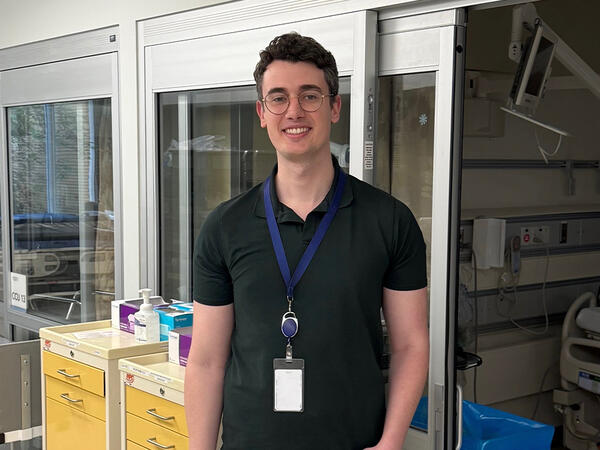With an overall success rate of just 15 per cent, winning funding from the Canadian Institutes of Health Research (CIHR)is a steep challenge. As the federal agency that stewards Canada’s health research strategy, CIHR supports talented researchers pursuing cutting-edge scientific discoveries, for the benefit of Canadians and people throughout the world. In January 2018, CIHR announced their annual funding awards and several Leslie Dan Faculty of Pharmacy scientists were among the successful applicants.
“This is an incredible achievement for our scientists,” said Stéphane Angers, Associate Dean of Research at LDFP. “These project grants are focused on ideas that have the greatest potential for impact and advancing knowledge, treatments and health outcomes, so this is a very exciting recognition of the leading work we are doing at the Faculty of Pharmacy.”
2018 Leslie Dan Faculty of Pharmacy CIHR Project Grant Recipients:
Christine Allen, Professor and GlaxoSmithKline Chair in Pharmaceutics and Drug Delivery, Leslie Dan Faculty of Pharmacy
How will this grant support your work?
“This funding will allow my team to seriously examine the impact of using heat sensitive liposomes to deliver drugs used to treat breast cancer and Rhabdomyosarcoma, a childhood cancer. The opportunity to collaborate with the specialists at SickKids is exciting and deeply important to me.”
- Project: Heat activated liposomal delivery of chemo and molecular therapy in combination with radiotherapy for treatment of breast cancer recurrence at the chest wallGrant: $459,000/ 4 years
- Project: Thermosensitive Liposome Formulation of Vinorelbine in Combination with MR-Guided High-Intensity Focused Ultrasound Mediated Hyperthermia: An Innovative Approach to Treatment of RhabdomyosarcomaGrant: $344,250/ 3 years
Carolyn Cummins, Associate Professor, Leslie Dan Faculty of Pharmacy
How will this grant support your work?
“This funding will allow my team to explore the fundamental mechanisms by which stress hormones and glucocorticoid drugs promote diabetes. Our goal is to help prevent the development of diabetes by investigating these signaling mechanisms and creating therapeutic drugs to target these pathways. This funding will also allow me to train the next generation of pharmaceutical scientists to identify new drug targets and develop therapeutics.”
- Project: Nuclear Receptor Signaling in High-Fat Diet and Glucocorticoid-Induced Metabolic DiseaseGrant:$818,550/ 5 years
Raymond Reilly, Professor and Director, Centre for Pharmaceutical Oncology, Leslie Dan Faculty of Pharmacy
How will this grant support your work?
“Triple negative breast cancer is notoriously difficult to treat because it does not respond to many of the existing treatments used for other kinds of breast cancer. This grant will allow us to investigate a potential new radiation treatment using antibodies that bind to the cancer cells, and that carry a radioactive material that will irradiate and kill these cells – like a bull in a china shop.”
- Project: Auger Electron Radioimmunotherapy for Treatment and Prevention of Metastases from Triple-Negative Breast CancerGrant: $684,675/ 5 years
Peter Wells, Professor, Leslie Dan Faculty of Pharmacy
How will this grant support your work?
“This new funding will allow us to confirm if deficiencies in BRCA1 protein play a role in fetal brain abnormalities in mice that might contribute to autism spectrum disorders and fetal alcohol spectrum disorders. Through this work, we may also be able to determine the basis for the protective effects of BRCA1. This is important because such insights will expand our basic understanding of developmental biology and stimulate similar studies in humans. If similar processes occur in humans, this understanding may spark the development of novel methods for diagnosing previously unknown high-risk children and investigation of potential treatment options.”
- Project: A novel role for the breast cancer 1 protein (BRCA1) in prenatal protection against oxidative DNA damage, embryotoxicity and abnormal postnatal brain functionGrant: $642,600/ 5 years
More News
Image

Welcoming Ivy Lam as Academic Lead in Climate, Health & Sustainable Care
Assistant Professor Lam will guide the Leslie Dan Faculty of Pharmacy's efforts to embed environmental sustainability across the Faculty.
Read More
Image

Pharmacy alum’s research shows how full-scope practice improves cancer care
Honoured with a national award, Adrian de Boer says his residency experience was a powerful reminder that he's making a meaningful change to the pharmacy profession.
Read More
Image

Pharmacy alum passionate about helping community pharmacists practice to full scope
As a pharmacy leader at Rexall, Heidi Wittke uses frontline experience to lead initiatives that improve patient care
Read More
